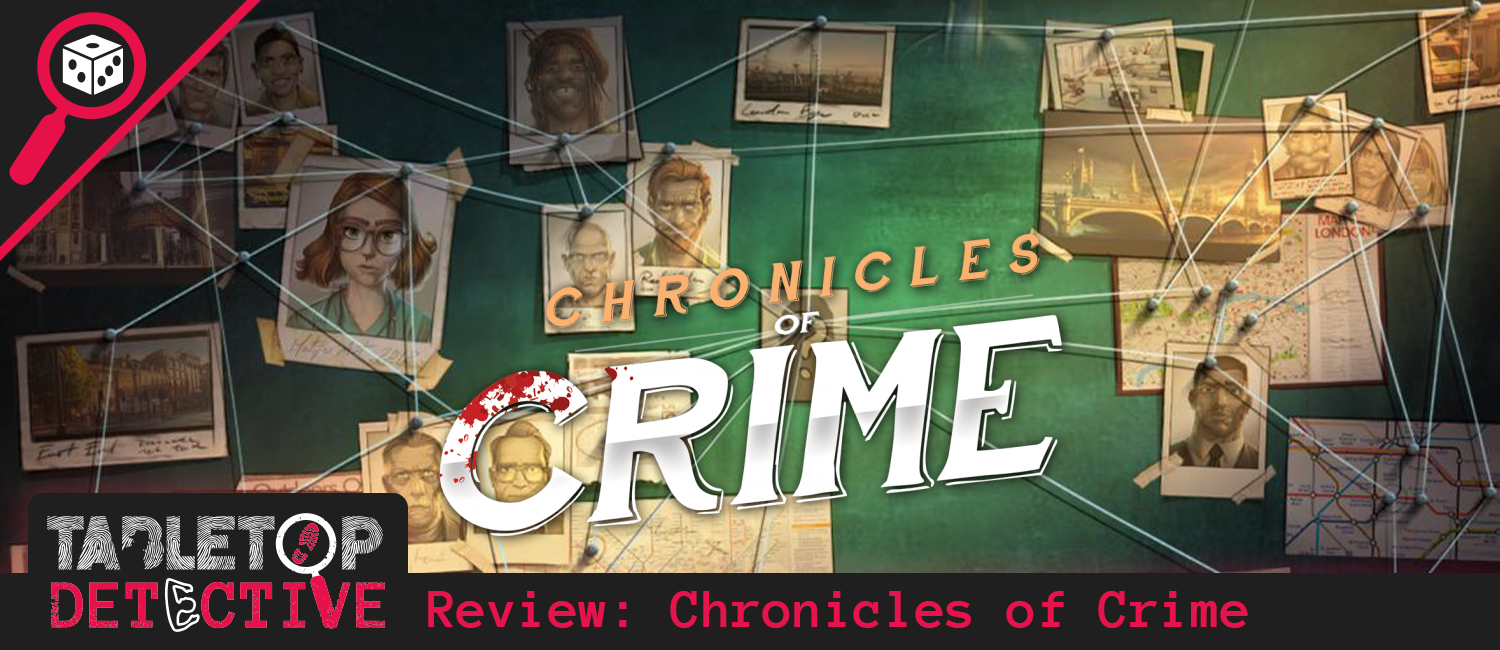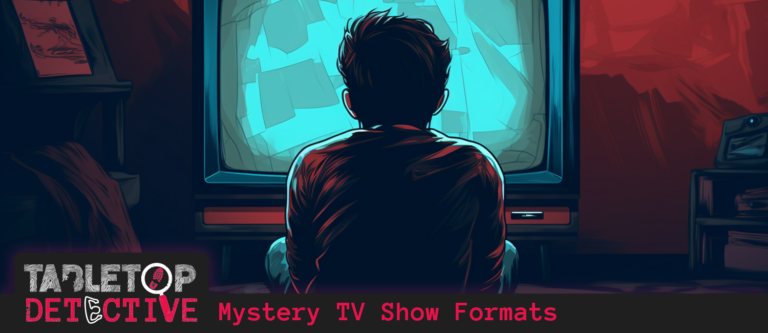If you’ve read my “content disclaimers“, you already know that “positivity first” is an important philosophy of mine. So it should come as no surprise that I love Chronicles of Crime, and that’s why I’m writing a review. But despite my enthusiasm for one of our household’s favorite games, I’ll still do my best to give you enough of an overview so you can decide if you’re equally likely to love it before you pick up a copy.
Also, don’t worry about story spoilers. There won’t be any.
Chronicles of Crime from Lucky Duck Games is a hybrid board game with a supplemental mobile app. You play as a detective for Scotland Yard, examining crime scenes, interviewing witnesses, identifying evidence, and ultimately arresting a suspect. We’ll call it procedural-lite.
While the game includes all the physical components you need to play, the mobile app frames the story-telling experience for each case, and provides context for the physical components.
What do I mean by that? How about some examples…
The Chronicles of Crime base game, also known as London’s Forensic, includes 40 character cards, 35 evidence cards, 10 special item cards, 12 location boards, 4 forensic contact boards, and 1 evidence board. Each card has a QR code, and can mean something different within each story. You’ll only find out when you scan the code throughout the course of your case.
The same character card might be your prime suspect in 1 case, your victim in the next, and your eye witness in yet a third. The same location image of a London alley might represent your murder scene in one case and the back alley behind your prime suspect’s workplace in the next.
Even your evidence cards portray broad categories that mean different things in each case. When you examine your crime scene in your first case, “Papers” might be an angry note that reveals the murderer’s motive, while “Papers” representing a takeout menu might simply lead you down a false trail interviewing an unrelated witness in another.
The same holds true for your forensic contacts. While the doctor’s autopsy findings might be the key to your first case, you might never uncover the true reason your second victim died without the hacker’s help recovering threatening text messages deleted from a smashed phone.
But the app doesn’t just reveal the story and provide context to evidence and locations. It also allows you to examine the details of your crime scene for a brief period of time. Our pro tip for making the most of this time is having one of us view the crime scene and simply shout out things we see, while the other player takes notes. And if you feel like you missed a lot, you can always invest the time to view the scene again.
But time is always against you in Chronicles of Crime. From the moment your boss assigns you the case, you’ve got a deadline, whether because your suspect might get away, or because your boss is under political pressure to close the case quickly.
And everything takes time. Traveling around the city. Waiting for lab results. Revisiting your crime scene. Talking to witnesses. Examining evidence. Checking in with your boss.
If there’s one down side to Chronicles of Crime, it’s the relentless march of the clock reminding you that you can’t do everything. And because the game is app-driven, there’s no fudging the time pressure with more lenient house rules. So if you end up down a rabbit hole chasing a red herring, it can be difficult to recover.
If that happens to you, I recommend skipping the summary at the end revealing the true story, and simply start the case over.
At the end of each case, you return to Scotland Yard, where your boss asks you a series of questions about the case. To answer, you scan the relevant card (evidence, location, character–whatever fits the question). At the end of the Q&A, you get a score based on how many nuances of the case you revealed through the course of your investigation.
Your other best tool is the difficulty rating on each case. Start with the official tutorial case to get a feel for the gameplay. Then move onto “Easy” cases, then “Medium”, then “Hard”. The base game comes with 6 cases, with 7 more “Extra Scenarios” that also use the base components and the London’s Forensic setting, available for a small fee each.
Don’t look for ciphers or puzzles in Chronicles of Crime, like those you’d find in a Hunt A Killer or Deadbolt Mystery Society mystery box, so put away your Tabletop Detective cipher solver poster, scratchpad, and reference cards for this one. This game isn’t about unraveling the puzzles of a mastermind.
Instead, it rewards you for powers of observation and your ability to tease key information out of witnesses and suspects alike. That said, I truly believe it’s equally satisfying and challenging in its own right. And it’s one of our favorite games.
In summary, Chronicles of Crime is probably for you if you love:
- Cooperative gameplay
- Following a trail of clues
- Sorting false leads from valuable evidence
- True sense of urgency
- Hybrid gaming experience
The Chronicles of Crime universe includes a few other games following the same case-solving model, with minor gameplay variations that fit the them, but I do wish Lucky Duck Games continued to release new content so players could take advantage of the previous physical components.
So if you love the game as much as I do, join my crusade to convince them to keep writing new cases!




